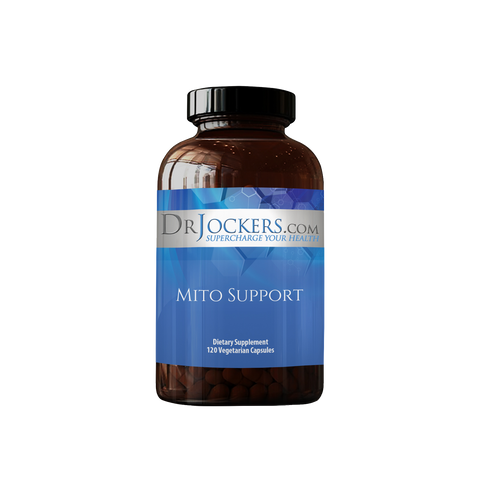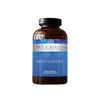
This is a fantastic product that will support the overall health and vitality of anyone over 40 years of age. Individuals with chronic fatigue and cardiovascular conditions may greatly benefit from this as well. - Dr. Jockers
Let's discuss the key benefits of Mito Support:
Why are people taking Mito Support
Read our customer reviews and you'll see why our clients agree these are...
Supplements You Can
TRUST
Mito Support

Why choose Mito Support ™?
Mito Support™ is a formulary blend of nutrients, nutraceuticals, botanicals, and Krebs cycle intermediates designed to support efficient mitochondrial metabolism and energy (ATP) production for increased vitality.
This formula may be appropriate for anyone wishing to promote overall cellular and tissue vitality and health, including those wanting to increase energy output for athletic performance.

What are mitochondria?
The mitochondrion receives most recognition for its role in generating energy for cells in the body and they are commonly referred to as the powerhouse. Amazingly, the mitochondria in our cells have also generated a significant amount of attention from scientists and physicians in the most recent decade for their role in numerous other life processes.
Except for red blood cells, mitochondria are unique organelles contained in every cell of the human body and contain their DNA (1). Along with generating 90% of cellular energy in the form of ATP (adenosine triphosphate), mitochondria are involved in major metabolic functions of the human body. (2)

What is the role of the mitochondria?
Mitochondria are found in varying concentrations in different tissues in the body and are specialized for that tissue. For example, mitochondria contained in the liver are designed to convert ammonia into a less toxic waste substance known as urea in a series of reactions (3).
Analysis of the breast muscle of chickens compared to the actively flying pigeon observed that the pigeon had a higher concentration of mitochondria in the breast muscle (4).
Both examples represent the differentiation of mitochondria and signify how both genetic and environmental factors influence mitochondrial function.

What are the physiological effects of the mitochondria?
The healthy function of mitochondria is essential to life sustaining metabolic processes, including: (1, 5)
- Regulating ion concentrations such as calcium buffering critical to intracellular communication
- Maintain roles in fluctuating lipid levels
- Synthesizing products necessary for the transportation of glucose and insulin
- Providing sufficient energy for blood flow to and within the heart
- Regulating the removal of cellular damage or apoptosis if the condition is deleterious enough to the mitochondrion’s function

What is the nutritional supplementation?
The health of our mitochondria depends on our daily diets and the nutrients that we feed these small, health-promoting powerhouses.
The structure by which mitochondria are designed to successfully create ATP is highly reliant on various types of structural proteins, enzymes , and other key vitamins that can be supplemented with your diet. The following nutrients have been shown to treat mitochondrial dysfunction:
L-Carnitine: L-carnitine is produced by the body but can also be found in red meat. This amino acid is involved in transporting compounds and also stimulates glutathione production.
B Vitamins: Various B vitamins have been shown to play a critical role in mitochondrial function such as biotin and vitamin B-12. B vitamins are highly specialized antioxidants and increase the synthesis of other strong antioxidants such as glutathione.
Alpha-Lipoic Acid: Alpha-lipoic acid has been especially shown to improve mitochondrial dysfunction in the brain and can improve cognitive ability.
Coenzyme Q10: Coenzyme Q10 (CoQ) is not only an antioxidant but it is also an essential component of the electron transport chain within the mitochondria. In other words, without CoQ10, there is no synthesis of ATP and therefore a defective mitochondrion.
Oxidative stress can cause the mitochondrion to overconsume any available antioxidants and lead to a deficiency. Depending on the severity of symptoms, CoQ supplementation has been shown in studies to help with symptoms associated with CoQ deficiency.
My favorite supplement containing clinical doses for all of these key nutrients for mitochondrial health is Mito Support.

When does Dr. Jockers recommend this product?
This is a fantastic product that will support the overall health and vitality of anyone over 40 years of age. Individuals with chronic fatigue and cardiovascular conditions may greatly benefit from this as well.
My health coaches and I look at labs such as an organic acid test that tests mitochondrial health. When we see biomarkers flagged for poor mitochondrial function, we use this product to support the individual’s health journey.
What is the recommended dosage?
Normal Dosage: 2 capsules – 2x daily with meals
Advanced Dosage: 4 capsules – 2x daily with meals
When introducing a new supplement, we recommend taking the lowest dose for 2-3 days. As tolerated, increase the dose until you have reached the recommended normal or advanced guidelines. Reduce to a tolerable dosage if adverse effects occur.
Warning: Please consult your healthcare professional before using if you are pregnant, breastfeeding, or considering use for a child.
FAQs:
What allergens does this product contain?
This product is gluten free, dairy free, soy free, vegetarian, non-GMO and vegan.

Select Your Options & Add to Cart
Select Your Options & Add to Cart
† These statements have not been evaluated by the Food and Drug Administration.
This product is not intended to diagnose, treat, cure or prevent any disease.






